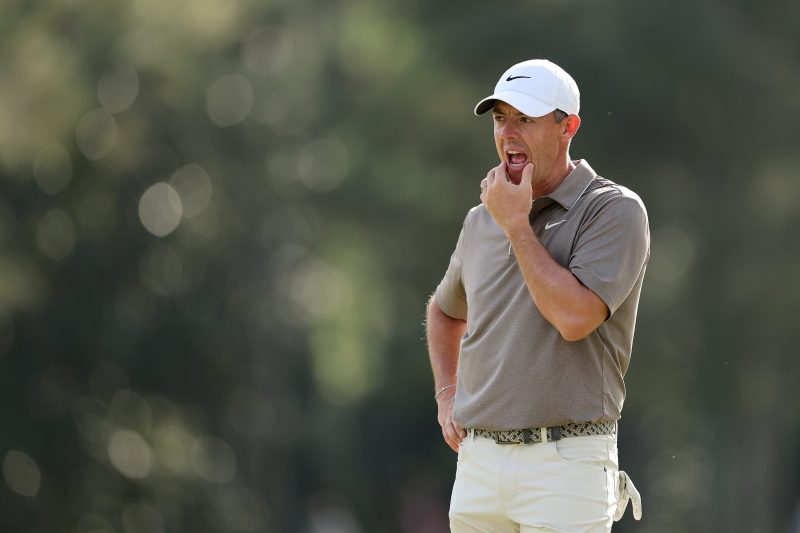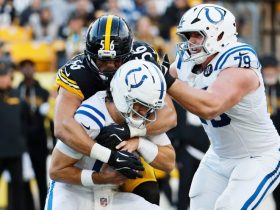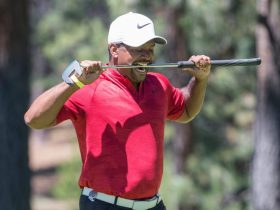AUGUSTA, Ga. – If Rory McIlroy is ever truly in position to win one of these things on a Sunday afternoon, make sure you’ve taken your medication, keep your cup full of whatever helps you relax, take deep breaths every few minutes and grip your rosary beads tight.
Here’s the reality of the situation: Augusta National is in his head. It’s lodged in the deepest, darkest places of his psyche. It draws out his worst instincts in the wrong moments. He’s tried everything to figure it out. And once again, it appears McIlroy will be back next year answering all the same questions that have hounded him for more than a decade at the Masters.
McIlroy came to Augusta on Monday as the main character, the popular pick, the guy whose form this year suggested he was ready to take the big step into a green jacket and finally complete the career Grand Slam. He put in the work in the offseason to tidy up his wedge game and develop some lower-trajectory shots that might come in handy around this place. He even went to see Jack Nicklaus last week to talk about how he was going to play the course, literally shot by shot.
“I think it’s about time that Rory won,” Nicklaus said. “He’s got all the shots. He’s got all the game. He certainly is as talented as anybody in the game. But if you look, go back and see his history the last few years, he gets to a place a lot of times and an 8 or 7 pops up, and that keeps you from getting where he needs to go.”
That was Thursday morning. And by Thursday evening, you have to wonder: What was it all for?
Because even though McIlroy isn’t necessarily out of contention after shooting an even-par 72, it was arguably, pound for pound, the most disappointing Masters round of his career.
Of course, that’s just conjecture. It would have been good to get McIlroy’s thoughts on the matter, but he went straight from the 18th green to the scoring office to the practice range and out of this place before answering any questions from the media. Which is absolutely his right, but it’s also becoming a little bit of a trend toward unprofessionalism after big disappointments. He did the same thing last year at Pinehurst after a letting the U.S. Open slip away to Bryson DeChambeau.
Whatever. That’s not the most important story here.
The more pressing issue is that McIlroy was absolutely cruising toward a 67 or 66 on Thursday – at worst. He was pounding the driver, controlling the irons, scrambling when necessary. It was beautiful golf. And when he walked off the 13th green after a tap-in birdie that got him to 4-under par, it looked like McIlroy might even have a chance to catch first-round leader Justin Rose at 7-under.
And then, inexplicably and for no obvious reason, it went completely the other direction.
After failing to convert a nine-foot birdie putt on No. 14, McIlroy stood in the middle of the 15th fairway with a 4-iron from 241 yards away. His shot was on line, landing close to pin high, but took a firm bounce and bounded long of the green. Still, it seemed like a straightforward situation: Cozy a delicate chip down the hill, walk away with no worse than a par.
There’s no other way to describe what happened next: It was a complete disaster. A self-immolation. An unnecessary mistake someone of his experience on this course should not make. From the moment McIlroy made contact with the ball, it was obvious he had carried it too far on the green, hit it too hard and that it wasn’t going to stop until it had trundled all the way off the front edge and into the pond.
It was, in a word, stunning. And it’s the shot that so many players knew they had to be defensive about because the 15th green is one of four at Augusta National that was rebuilt this year, making it firmer to begin with. Then when you factor in the greens getting a little dry and crusty late in the afternoon, plus a tough pin placement, it’s a truly treacherous place on the course – which makes it all the more confounding that McIlroy played the shot so aggressively.
“You can easily hit a nice pitch on that green and it just rolls in the water, which I’m sure a lot of guys did today,” said Viktor Hovland, who was playing one group in front of McIlroy and almost certainly did not see what was happening behind him. “You don’t have to be far off to make a double.”
Which is exactly the score McIlroy recorded after a mediocre pitch from the other side of the pond. As Nicklaus alluded to, it was one of those big numbers popping up at the wrong time.
Still, better to have that happen early in the tournament rather than late, right? And it only took McIlroy back to 2-under. Even if he finished with a 70, which seemed like the worst he could shoot given the way he was playing, he’d be right there on the first page of the leaderboard.
But by the time McIlroy walked to the 16th tee, his entire mood had changed. About an hour earlier, he was chatting it up with Akshay Bhatia coming down the 10th fairway and waving to fans, walking with that trademark Rory strut you see when things are going well.
Now, he was sullen, his lips pursed. And he didn’t really hit a good shot the rest of the day.
On No. 17, McIlroy flared his 3-wood a little bit to the right off the tee, making the approach slightly more difficult. But he blew his approach way long, hit another terrible chip 28 feet past the hole and three-putted for another double bogey.
It was the kind of breakdown where you have to wonder whether McIlroy actually has what it takes to win here. Because Thursday’s collapse over the final four holes wasn’t about the golf shots. It was about what’s between his ears. It was about having the discipline and focus to not make the obvious mistake. It was about checking out instead of fighting back when he did something really dumb and costly.
McIlroy is a great champion, probably the best golfer of his generation and the owner of four major titles. He’s so good, with so much time still left in his prime, he’ll probably find his way to a fifth or even a sixth at some point – even though the drought now stretches back to 2014.
But the mental challenge of Augusta and the precise decision-making it requires on every single shot is obviously something he still fights, even at this stage when he’s got all the experience he needs and he’s playing some of the best golf of his career.
“There’s no golf course that suits a man better than (Augusta) does for Rory,” Gary Player said Thursday.
But that’s obviously not true. This place torments him. And it appears that will continue for at least another year.







